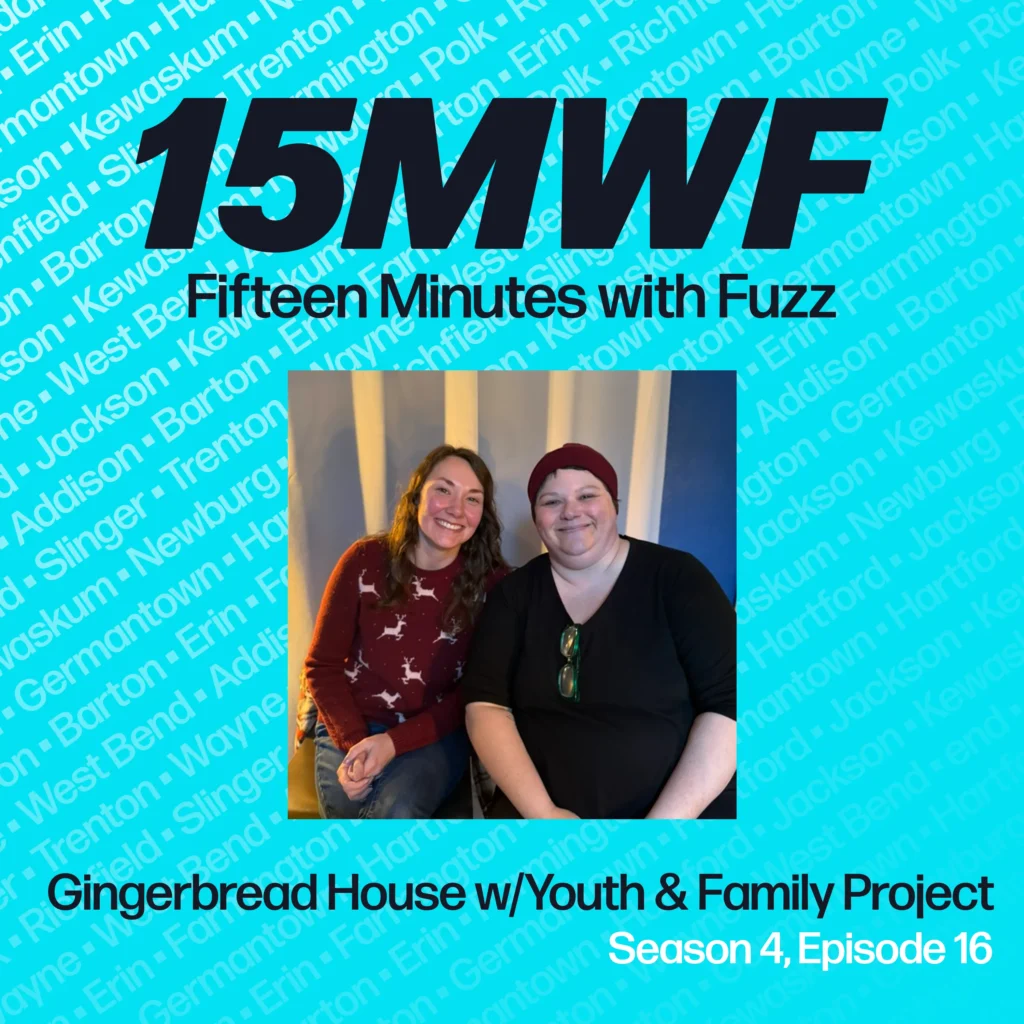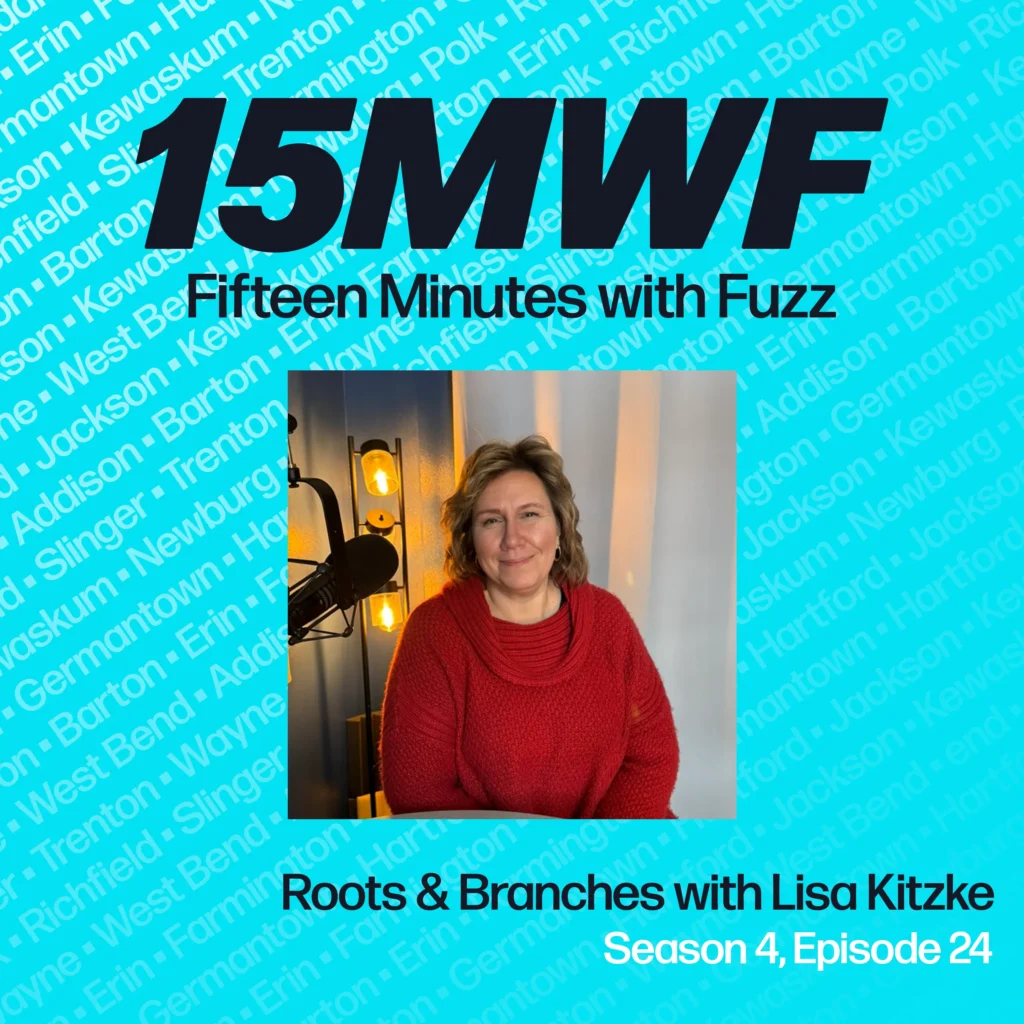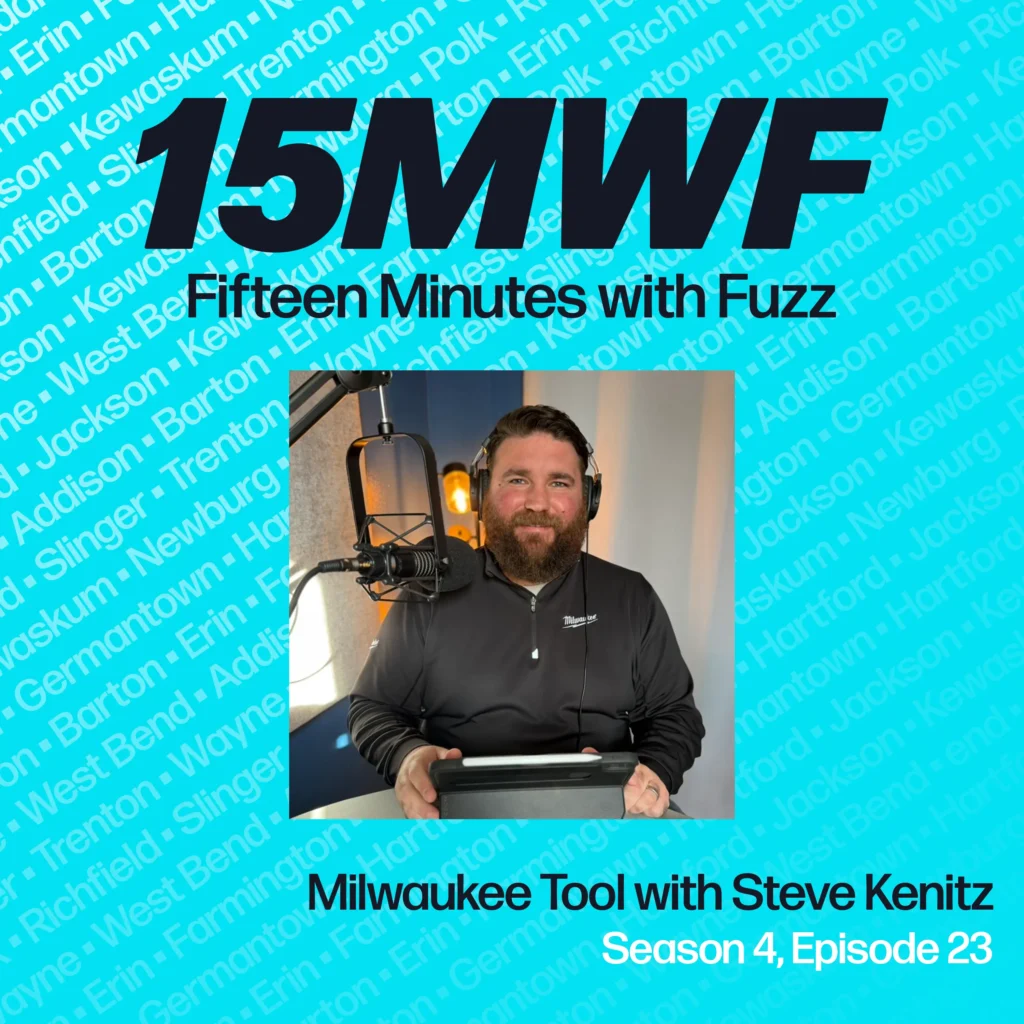[00:00:00] Fuzz Martin: Greetings, Washington County friends, and thank you for listening to Fifteen Minutes with Fuzz. If you’re a new listener, this is a show about positive things going on right here in our community. If you’ve listened before, well now you’ve heard me say that about 131 times since 2021.
Pretty neat, eh? But that’s what this show is all about, shining a light on positive things that aren’t politics or shouting at each other on social media.
Just peace and love, man. This week we’re going to talk about one of my favorite annual programs here in Washington County. Limor Hendricks and Christina McGinn from the Youth and Family Project join me to talk about the Gingerbread House. It’s a gift giving program where the community pitches in to ensure that area families in need have great Christmases and holiday celebrations.
With that, here are 15 Minutes on the Gingerbread House with Christina McGinn and Limor Hendricks. Right here on Fifteen Minutes with Fuzz.
Limor and Christina, thank you so much for joining me today. Could you give us an overview first of the Gingerbread House program and how it supports families? I guess I’d say in the Washington County area, right?
[00:01:29] Limor Hendricks: So it is just for Washington County families.
But the, the pickup is usually in the West Bend area. Last year we served over 550 families and what the program does is provide holiday gifts, and household needs to, families in need in Washington County.
[00:01:46] Christina McGinn: Our big thing is we, we don’t want the focus to be on gifts, so we really wanted to be about providing those memories, Christmas morning, everyone in the family has something to open, and you’re getting to do that together and create those, those family memories.
[00:01:57] Fuzz Martin: The Gingerbread House program has been going on for decades, right?
How long has this been going on?
[00:02:05] Christina McGinn: Over 20 years. Yeah, over 20
[00:02:07] Fuzz Martin: years. And how, how did it get started and how has it evolved over those years?
[00:02:12] Christina McGinn: Uh, so it’s, uh, Linda White, started the program. It was just a handful of families that she was really passionate about that. having the family memories, and being able to provide, especially for, you know, the kids that otherwise wouldn’t have gifts to open.
And the program has just, every single year we’ve found more families in need and kind of every year we’ve grown to the point we are now where we’re at over 500 family, over 550 families every year.
[00:02:36] Fuzz Martin: Well, okay, that was going to be my next question is how many families do you serve? So, that obviously takes a lot to get going, right?
So, 550 families is more than 550, people, right? Yes. So, that’s, that’s a lot of, coordination, um, outreach to those who are, you know, Not only buying gifts or supporting these families, but also the families themselves and getting them coordinated. There’s a lot that goes into it. When do you start, prepping for this each year?
How does , how long?
[00:03:06] Limor Hendricks: As soon as gingerbread ends really. Okay. Yeah. Pretty much as soon as one year is, uh, is completed, we start working on the next year.
[00:03:13] Fuzz Martin: How does this program meet the needs of all those, those families each year? What goes into that?
[00:03:18] Limor Hendricks: In terms of the application process, we try to make it as simple as possible.
We try to make it as accessible as possible. And our application is done online. It’s very streamlined. If people don’t have, the referral sources that, we’re asking for, they can always get a referral from their child’s school. If they have a case manager, if they’re working with a different agency on getting some services, and we’ve gotten a lot of referrals this year, that way.
And if they have trouble, filling out the application, they can call and, walk them through that and I can help them with that. And that’s the application process, basically. And we coordinate that. We plan out what that looks like, months before the program starts.
And then every year they’re always a little bit of, of a change depending on, capacity, and depending on, I mean, mostly it’s capacity, but also if we notice if there are any, Sort of rough spots or difficult areas for people.
We try to make it as easy as possible to apply.
[00:04:20] Christina McGinn: I think we, we meet with our volunteers, that support our program also after Gingerbread House and we take feedback from them and really try to apply that, and make sure that the program is successful on, on both ends as far as participants and sponsors and volunteers.
[00:04:34] Fuzz Martin: So, speaking of volunteers, with, with 550 families, how many volunteers go into making this successful each year? Roughly, I know you might not have specific numbers. Dozens.
[00:04:45] Christina McGinn: Yeah. We have, we’ve been very fortunate that we have, businesses that will come and do kind of a group outing and help. We’ve got a core group of volunteers that have been with us for, for several years that kind of know the ins and outs, that they are showing up, some of them every single day.
And they’re amazing. Yeah. That’s, yeah, our program is not
[00:05:02] Limor Hendricks: successful without our volunteers, for sure. Yeah, absolutely. The, the capacity is so large, there’s really no way we’d be able to do it without volunteers.
[00:05:10] Fuzz Martin: I assume you can always use more though, right? Absolutely. Yes. So if, if local individuals, businesses, other non profit organizations would like to get involved in supporting the Youth and Family Project’s Gingerbread House program, how could they?
How could they do so? What would be the process for getting started to help?
[00:05:27] Limor Hendricks: So on our Facebook page, we will post volunteer information, but also in the interim, if there are any people who want to volunteer, they can just reach out to us. They can message us on Facebook through our page. Or they can call the office directly and we will direct them to our volunteer coordinator.
[00:05:44] Fuzz Martin: And, does that also go for if, if a business or family wants to, donate to the program or either donate in terms of financially or if they want to, donate gifts? I know some, like our family each year, we look forward to getting a family that we, you know, get the age and what the child is looking for and then, we make it a point to show our kids that we’re going out and buying for another kid who needs something this year and, it’s a kind of a, a learning process for our kids,
so for those who want to, to do that is that they go through the kind of the same process.
[00:06:20] Christina McGinn: Yes. So we have a form you fill out. Um, you can tell us what size family you want, if there’s anything specific. If there’s certain ages of, of kids, that you want to shop for, we take all of that, try to match you as closely as possible with the family. You get a wishlist for every family member as well as, household items that they might need.
And do all of the shopping and you can drop that off, once we’re in our location. We also have a wish list, that we do with a wholesale company that you can purchase items in bulk for us that we use. You can also come and just drop items off when, when we’re there. and kind of see, what’s, what’s going on and see what, what all of that looks like.
We also have a lot of local businesses that do collections for us, that you can drop off items there.
[00:07:09] Fuzz Martin: Excellent. So speaking of items, what would you say are the most essential items that The community can donate that would make the biggest impact.
[00:07:18] Christina McGinn: I would say items for our adult family members. You know, we have Fleet Farm and Menards that both do toy drives for us.
We get tons of donations of toys. But again, because, you know, we really want to have the, the family memories of opening gifts. We like the parents and, and adults in the families to have gifts as well. So, yeah. Hairdryers, curling irons, makeup, cologne, deodorant, tools, car kits, fishing stuff. Those, those items that are more geared towards adults are definitely mostly.
[00:07:49] Limor Hendricks: Small electronics, things like that.
[00:07:50] Christina McGinn: Yeah.
[00:07:51] Fuzz Martin: Okay, and that, yeah, definitely. And, because everybody thinks about kids, I think, when you’re, donating, It’s easy to, think about that, but think about the families as well and, and bringing a smile to everybody’s face, I think. How does Youth and Family Project work to make this experience uplifting for families in need around the holidays?
[00:08:12] Limor Hendricks: So we really try to make everybody feel welcomed. We try to make it as easy and comfortable as possible. We don’t ever want anyone to feel like, like they should be embarrassed about this because, you know, everybody hits a rough spot and that’s why we do this. We want to make sure everybody’s got like a really great holiday experience.
And when they come in, even though it’s a bit chaotic when they come in to pick up their gifts, they’ll, they’ll meet smiling people. It’ll be festive. And this year we do have something extra fun planned. I can’t really share the details yet. But it’ll be, hopefully we’ll be able to pull it off.
It’ll be like a special, extra, very family friendly, very holiday friendly kind of a, of a treat for everybody.
[00:08:58] Fuzz Martin: Excellent. Speaking of that, do you have any fun, positive, uplifting stories from the past that kind of stand out to you, from years past with Gingerbread House?
[00:09:10] Limor Hendricks: So, for me, there, there are a lot of families who come in and they get very emotional when they see the generosity of the sponsors and the donors.
One in particular, was a woman who’d never applied to the program before and was a little bit confused about, how it was a run and wasn’t sure if she missed, the deadline to pick up. And when she came to, pick up the toys, and the other gifts, she was, she was very overwhelmed.
She was very emotional and grateful and couldn’t stop thanking me. And I just reminded her. That it’s not me she needs to thank. She doesn’t need to thank anybody, but that this is the community basically coming together. And it’s just, it’s a very feel good kind of a moment to know that, that people are getting these special memories.
That even though they’re going through difficulties, at least their holidays, are gonna be this, like, beautiful, uplifting, enjoyable, memory. And we get emails. After the program closes, from families who are just so grateful and tell us how their families never had such an amazing, holiday season and that they’re really moved and touched, and that, that is a wonderful feeling.
[00:10:23] Christina McGinn: I do too. I love, we’ve have a handful of families that have come full circle that started out as participants, have gotten into a better place in life and become sponsors. And they are so thankful that they are able to get back to the, the program that helped them when they, you know, wouldn’t have been able to provide Christmas for their family otherwise.
[00:10:38] Fuzz Martin: Excellent. Love that. Can you, going back to the volunteers or community members, can you tell us about, you know, maybe a community member or volunteer that has played a crucial, crucial role in Making the Gingerbread House program, successful.
[00:10:56] Limor Hendricks: I would say our core volunteers who show up almost every day, who show up year after year, who, who really understand how the program works and are just, are just there to do whatever needs to get done.
And they’re, they’re just amazing. And we will thank them. We will have a post up and thank them specifically, but they’re, we have a core group of volunteers who is just amazing. Their dedication. And their, their passion for this is, is incredible. And we, yeah, we absolutely could not do this, without that help.
We’re a relatively small agency. We don’t have that many staff members. And, yeah, they literally make this program.
[00:11:34] Fuzz Martin: Um, was very good segue. So speaking of that, for those who are new to the Youth and Family Project, what are some of the broader ways that your organization helps the youth and families here in West Bend and Washington County?
[00:11:47] Christina McGinn: Yeah, so we’ve got a couple of different programs outside of Gingerbread House that we run. We have Family Corner, where we provide supervised visitation for non custodial parents and their kids in a, you know, in our office, which is an all converted house, really comfortable environment to just try to make everyone feel really safe and comfortable.
We have our Crossroads program that provides free counseling services, uh, within the schools in Washington County.
[00:12:12] Limor Hendricks: And, and we also do outreach, so we’re out in the community, our services with people, giving them information about how to access mental health. And we also have the LGBTQ plus services.
We have support groups for both youth and caregivers, and try to connect them to resources and information, so that they can navigate and parent effectively and, and have the support that they need.
[00:12:35] Fuzz Martin: What are some of the biggest challenges that you face, running, we’ll say running this program, in general, the Gingerbread House program.
We’ll start with that.
[00:12:44] Limor Hendricks: The biggest challenge is the location because we, we need a location every year. We don’t have a permanent location. And we need a really big space. It’s a lot of gifts. It’s a lot of donations. And we have to be able to sort them, to, to group them properly, to make sure that when people come and pick them up, It’s not complete chaos.
Mm-Hmm. . And we still don’t have a location this year.
[00:13:06] Fuzz Martin: When you say really big, what, what kind of space are you talking?
[00:13:09] Limor Hendricks: So approximately 12,000 square feet.
[00:13:11] Fuzz Martin: Okay.
[00:13:11] Limor Hendricks: Preferably with bathroom facilities, accessible parking. Hopefully with some heat because it does get cold.
Mm-Hmm. . Um, and really we need it for the entire month of December. A little bit before and a little bit after is very helpful. Um, and really the ideal space that we’ve identified would be the closed UW campus. That would be a perfect location for us. It’s empty, it’s got all the facilities, it’s got the parking, um, yeah.
And that would be an amazing spot for us.
[00:13:43] Fuzz Martin: Um, if somebody has a space 12, 000 square feet or bigger with, parking and, restrooms. How can, should they get in touch with you directly off the website? What’s the best way to get in touch?
[00:13:57] Limor Hendricks: Yeah, absolutely. Um, if they could reach out to us, they can speak specifically, to Emily Green, who’s our executive director.
That would be fantastic. If people have an interest in, helping us secure the UW campus, they can, they certainly can email the county, and encourage them. Because this is a really big program, it, it helps thousands of people in Washington County. And we would like to make it as smooth as possible for everybody.
[00:14:25] Fuzz Martin: Alright, very good. Looking ahead, how would you like to see the Gingerbread House program grow or change to meet future needs for our community? www. gingerbreadhouse. com
[00:14:35] Christina McGinn: I think, like Limor said, space is always an issue, so having a donated space that we can depend on would be super helpful, especially just in terms of figuring out how to lay out, things every year to make it be as smooth as possible.
You know, when you have 550 families worth of gifts, that’s a lot of packages, a lot of things to try and keep track of, keep organized as people are dropping off and picking up. So the more space that we have to be able to do that makes it easier. We are always looking for more sponsors to provide those gifts for our families.
You know, our participants grow every year. Our sponsors don’t grow at quite the same rate. Um, so, or even businesses that are willing to, you know, do gift collections for us is, is always super helpful.
[00:15:22] Limor Hendricks: Yeah. And we could always use, financial donations as well to help, pay for the actual running of the program.
As well as additional programming that we want to roll into it, like I mentioned, the little surprise we’re hoping to pull off, that we will definitely be pulling off next year, but that requires sponsorship as well. So if anybody has interest in sponsoring the program itself as well, just reach out to us.
[00:15:49] Fuzz Martin: Very good. And then, one last time for listeners interested in getting involved, if they have a potential space in mind or if they want to make a donation, what’s the best way for them to contribute or reach out to the Gingerbread House program?
[00:16:04] Christina McGinn: So if they want to sponsor a family, they can go on our website and there’s a link to become a sponsor and fill out that form.
They can also email us at, gingerbread at youthandfamilyproject. org. Or, uh, they can call the office and we’ve got a menu they can get to us, 262 338 1661.
[00:16:23] Limor Hendricks: And that would apply for anybody who has a space in mind, as well. If somebody wants to apply, applications are still open until November 22nd.
That information is available on both our Facebook page and our website.
[00:16:37] Fuzz Martin: Alright. Very good. Well, Limor, Christina, thank you so much for coming in. Thanks for all you do for people in our community who, need a little joy this time of year and, really appreciate all you do, for folks in Washington County.
again to Christina McGinn and Limor Hendricks from the Youth and Family Project for joining me on this week’s episode of Fifteen Minutes with Fuzz. Again, if you have a lead on a building they can use to house their efforts this season, please reach out to them. And as always, if you ever have an idea for a guest for this show, please reach out to me.
You can email me fuzz at fuzzmartin. com, that is fuzz at fuzzmartin. com. You can text me 262 299 FUZZ, that is 262 299 3899. Or you can fill out the form fuzzmartin. com slash guest. So many easy ways to get in touch. So few excuses for you not to. New episodes drop on Apple Podcasts, YouTube, Spotify, and at fuzzmartin.
com every Tuesday. And with that, I will talk to you next Tuesday, right here on Fifteen Minutes with Fuzz.




